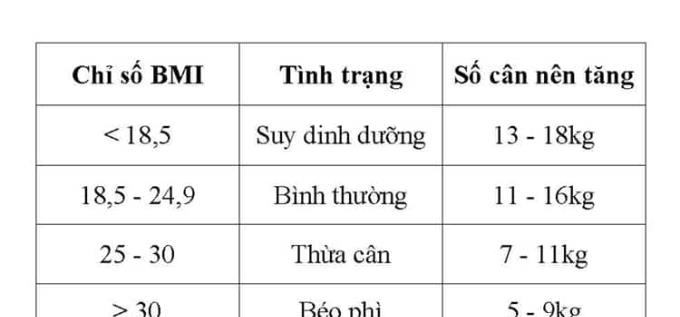Before getting pregnant, if you are overweight, obese or overweight, you need to know how to lose weight during pregnancy safely and effectively for a healthy baby.
Weight gain during pregnancy is normal and necessary. Your body is still undergoing changes to adapt to your baby's development. So, compared to before pregnancy, you need to provide 300 extra calories per day in the 2nd and 3rd trimesters. However, what if you are malnourished or obese? How much weight should you gain accordingly? What is the most effective way to lose weight and control it? Please join aFamilyToday Health to answer the above questions.
Pregnant mothers need to gain weight when pregnant how much is just?
When pregnant, how much weight should pregnant mothers gain? That depends on the weight of the pregnant mother before pregnancy. What may your weight be: normal, malnourished, obese or pregnant with multiple pregnancies?
You will enter your settings in the pregnancy weight gain calculator , which will estimate and display the corresponding weight gain you need to gain during pregnancy. This requires you to know your prenatal weight, current gestational age in weeks, height, current weight and if you are pregnant with multiple pregnancies.
Chart of weight gain during pregnancy
If you are pregnant with multiple pregnancies, you need to gain between 16.5 and 24.5 kg. In fact, the baby was born weighing only a few kilograms, so what will the weight increase you include?
Weight distribution during pregnancy
The weight that you gain during pregnancy is distributed as follows:
The baby's weight is about: 3.5kg
Placenta: 0.7kg
Amniotic fluid: 1kg
Uterus: 1kg
Bust: 1kg
Liquid: 2kg
Blood: 2kg
Fat and other nutrients: 3kg.
Therefore, you need to gain weight for a healthy baby and for your body to be healthy enough.
Is it safe to lose weight during pregnancy?
If you were obese before pregnancy, your doctor will ask you to lose weight. However, you should only lose weight under the supervision of a doctor. Pregnant women should not diet and lose weight without medical advice.
During pregnancy, it is completely normal to gain or lose weight. You can lose weight in the early stages of morning sickness, then gain weight in the middle phase.
9 safest and most effective ways to lose weight during pregnancy

Many pregnant women who are overweight are often told by their doctors to lose weight during pregnancy, in the first and last trimesters. However, if you lose weight too quickly, talk to your doctor about this. The causes of weight loss are often morning sickness and digestive problems.
If you are looking for ways to effectively and safely lose weight during pregnancy, here are some tips to try:
1. Understand calorie needs that your body needs
Pregnant women should not gain too much weight. Therefore, you need to know how many calories your body needs each day. Talk to your obstetrician to learn more about your body. Do not imitate others on low-carb diets to lose weight as this will affect the health of you and your baby.
In addition, you can refer to the article Basic nutrition every pregnant mother should know for more useful information.
2. Split the serving size: How to lose weight during pregnancy is easy to implement
This will help you control your pregnancy weight effectively. Eating small meals regularly will help you stay in control of your portion sizes.
In addition, you should drink 1-2 glasses of water before meals. This will make you feel fuller and thus lose weight effectively. Some studies have shown that the habit of drinking enough water before eating helps overweight and obese people control their weight effectively.
3. Take vitamins

During pregnancy, the body must be provided with adequate nutrients. Your doctor will prescribe you the necessary vitamins . If you want to control your weight but still ensure you have enough nutrients, there is no way but to take vitamins. However, this does not mean that you want to lose weight, so skip the meals of the day instead by adding vitamins to your body. The body can only tolerate the best supplements when eaten with food and vitamins from foods are often easier than supplements.
4. Eat nutritious foods
During pregnancy, you need to have a suitable diet and provide adequate nutrition for the body and normal development of the fetus. You should:
Eat more foods that contain fiber: Fruits and vegetables.
Cereals and whole-grain breads.
Low-fat milk or milk.
Foods rich in folate include: oranges, strawberries, spinach, broccoli, and legumes.
Unsaturated fats such as: olive oil, peanut oil.
The most effective way to lose weight is to limit your intake of certain foods such as:
Canned foods are high in artificial sweeteners.
Foods and beverages containing sugar or syrup such as soft drinks, coffee, fruit juices, soft drinks (milk tea, lemon tea ...) ...
Snacks like: chips, candies, cookies and ice cream. You can eat in a while, but don't make it a habit.
Avoid adding too much salt to foods.
Unhealthy fats such as margarine, gravy, sauces, mayonnaise and salad dressings.
5. The way to lose weight during pregnancy is not to overeat
Being pregnant doesn't mean you have to eat for two. Each day, you only need to add 20g of protein and 300 calories of energy. In addition to calories and protein, you need to add other essential nutrients such as folic acid, vitamin B12 and calcium ...
Nuts are rich in protein, milk and whole grains are high in calories. Eggs and yogurt are good sources of protein, calcium and vitamin D. Spinach has a high content of folic acid so it is very good for the body. Red meats are rich in iron. Eating too much will lead to overweight, obesity, causing problems such as high blood pressure, gestational diabetes ...
6. Prepare your own lunch

Preparing your own lunch with lots of vegetables for work instead of eating out is an effective way to lose weight during pregnancy. But waking up many mornings, you will feel too tired to cook lunch, so prepare the night before. The menu for you to lose weight during this period is to increase the amount of green vegetables and fruits and limit fried and fried dishes instead of boiled and steamed dishes to reduce the amount of fat loaded into the body.
Thanks to that, the dishes you prepare yourself are still nutritious, cleaner and do not have too much fat and sugar starch compared to commercially available dishes. Also, be sure to eat a good breakfast and be sure to break down your serving sizes into several meals.
7. Choose a smart way to lose weight
Before you eat something, you must consider whether it is beneficial for you and your baby. Example: A pizza filled with cheese and bacon is delicious but has no essential nutrients. Therefore, when choosing food, you need to consider carefully.
Choose foods high in fiber, whole grains, reduce fat, carbohydrates, and avoid drinks or junk food with lots of energy such as soft drinks, milk tea, lemon tea, energy drinks. , cream cakes and pastries ...
8. Get enough sleep
According to research from Columbia University, if you sleep less than 7 hours a day, your eating needs can be disrupted. Have you noticed that when you wake up after a night of not getting enough sleep, you often feel very hungry? That makes you have a need to eat more and eat anything without consideration.
In addition, many other studies show that when the body feels tired, you also have a need to eat more. So, try to get enough sleep for your body to rest. Thanks to that, you can safely lose weight or control weight easily.
9. Exercise is an effective way to lose weight
Pregnancy does not mean stopping regular exercise and stopping exercising, unless directed by your doctor. Did you know that exercise during pregnancy is very helpful in controlling the weight of pregnant women? Note, before training, you should consult your doctor or a specialist in charge of fitness for pregnant women. Some exercises that you can do such as yoga for pregnant women , swimming, walking ...
Accept that the body is changing, gaining weight during pregnancy is a very normal and necessary for the development of the baby. After your baby is born, your weight will decrease. If you want to be in good shape, you can do exercises to help you lose weight after giving birth and maintain a healthy diet to get in shape.
If you lose weight too fast, how will your baby be affected?

Losing too much weight of pregnant mothers will lead to a number of health problems. This usually occurs in the early stages of morning sickness and can easily lead to the following complications:
Baby was born at a low weight
The risk of miscarriage is high, especially in the first trimester due to anorexia
Less amniotic fluid due to low nutrition
The baby's cognitive ability is poor
The fetus is small in size.
Pregnancy complications are common when pregnant women are obese
Losing weight during pregnancy is very important for pregnant mothers who are obese. Because of being overweight and obese during pregnancy puts you at risk of the following risks:
1. Gestational diabetes
Obese women have a 4 times higher risk of gestational diabetes than normal women. In addition, they are often ordered by a doctor to have a cesarean section and the fetus is at risk of birth defects .
2. Pre-eclampsia
Women with a high body mass index (BMI) are at increased risk of pre-eclampsia . This will increase the risk such as premature birth, embolism, stroke ...
3. Infections
Overweight women are more susceptible to infections during pregnancy and postpartum.
4. Sleep apnea due to obstruction

Obesity often causes sleep apnea . Pregnancy makes this condition worse.
5. Problems in labor
Obese women are at greater risk of experiencing the induction of labor , also known as inducing labor. Your doctor will use drugs to interfere with labor. This will make your childbirth worse.
6. Miscarriage
Obese pregnant women increase the risk of miscarriage and stillbirth .
7. Most likely to have a cesarean section
During labor, overweight women often do not have the strength to push the fetus out. In addition, excess fat deposits in the birth canal also makes it difficult for the baby to be born.
8. Birth defects
A mother who is obese makes her baby more prone to birth defects and a higher risk of stroke than normal mothers. In addition, the risk of hydrocephalus in infants is 60% higher, heart defect 30% higher, and lip defects 20% higher.
9. It is difficult to detect birth defects
Ultrasound is the best way to detect birth defects in the fetus. However, the distance a sound wave can travel is limited. Pregnant women who are obese often have a very thick layer of fat on the abdominal wall, which makes sound waves difficult to pass, making it difficult to detect birth defects of the fetus.
10. More severe pregnancy symptoms
Common symptoms in pregnancy such as back pain, headache, pelvic pressure, heartburn and carpal tunnel syndrome ... occur more often in overweight mothers.
If you are overweight, during pregnancy, you do not need to overeat. In fact, if you are obese, losing a few pounds won't affect your baby either. However, you must pay attention to your body weight and if you notice any abnormalities, immediately notify your doctor.

















